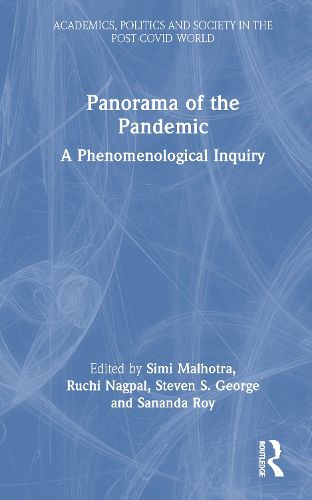Readings Newsletter
Become a Readings Member to make your shopping experience even easier.
Sign in or sign up for free!
You’re not far away from qualifying for FREE standard shipping within Australia
You’ve qualified for FREE standard shipping within Australia
The cart is loading…






This volume provides a multi-nuanced analysis of the impact of the Covid-19 pandemic on various aspects of human existence, encompassing societal, economic, and inter-relational dimensions. It highlights a broad range of artistic and literary experiences that unfolded as a consequence of the pandemic or speak to that time.
The book revisits pandemic-induced shifts, phenomenologically, including the digitization of art and representations of creativity, "performance" anxiety, socio-political climate determined by "racial algorithms," gaming surges, employment insecurities, mental health issues from a pedagogical materiality, and the nature of apocalypse through literary reimaginations. It also delves into the global food crisis, reframing of family structures, and local subjectivities as lived experiences.
A unique contribution, the book will be useful for students and researchers of cultural studies, digital humanities, mass media, sociology, mental health, psychology, medical anthropology, public health, literature, history of pandemics and epidemics, and South Asian studies.
$9.00 standard shipping within Australia
FREE standard shipping within Australia for orders over $100.00
Express & International shipping calculated at checkout
This volume provides a multi-nuanced analysis of the impact of the Covid-19 pandemic on various aspects of human existence, encompassing societal, economic, and inter-relational dimensions. It highlights a broad range of artistic and literary experiences that unfolded as a consequence of the pandemic or speak to that time.
The book revisits pandemic-induced shifts, phenomenologically, including the digitization of art and representations of creativity, "performance" anxiety, socio-political climate determined by "racial algorithms," gaming surges, employment insecurities, mental health issues from a pedagogical materiality, and the nature of apocalypse through literary reimaginations. It also delves into the global food crisis, reframing of family structures, and local subjectivities as lived experiences.
A unique contribution, the book will be useful for students and researchers of cultural studies, digital humanities, mass media, sociology, mental health, psychology, medical anthropology, public health, literature, history of pandemics and epidemics, and South Asian studies.